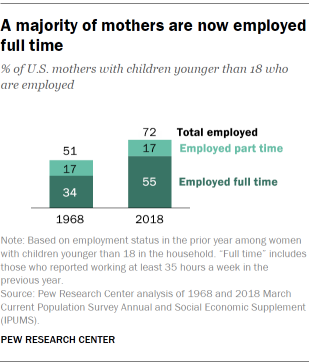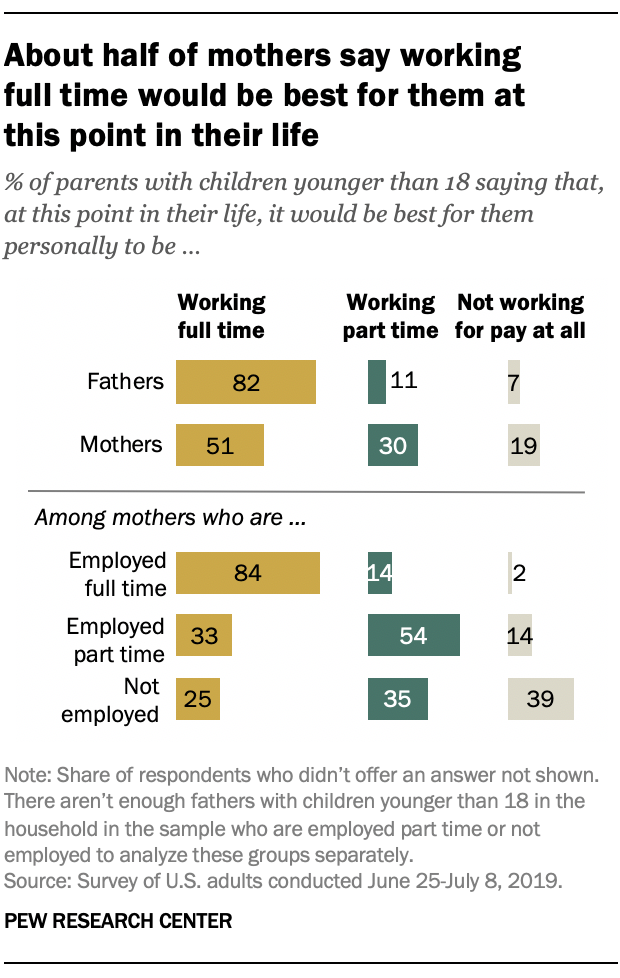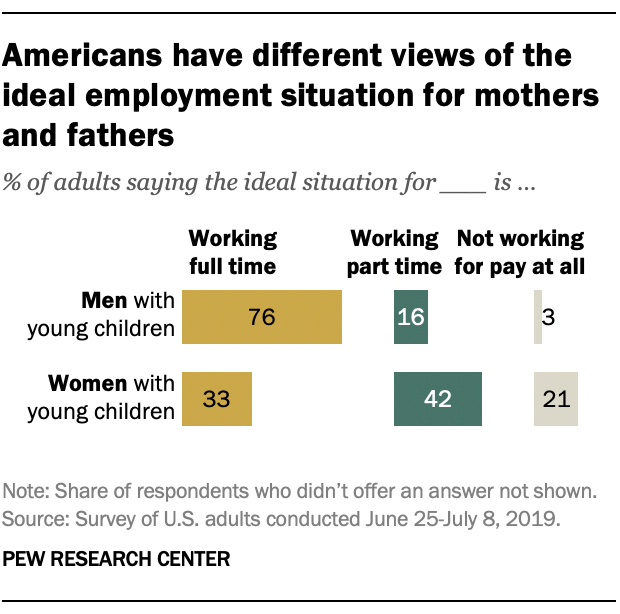
Balancing work and family responsibilities brings many challenges for working mothers and fathers with children younger than 18. Roughly half say being a working parent makes it harder for them to be a good parent, and about as many say that at times they feel they can’t give 100% at work. Despite these challenges, many working parents – including about eight-in-ten full-time working mothers – say their current employment situation is what’s best for them at this point in their life, according to a new Pew Research Center survey.
 A majority (55%) of U.S. mothers with children younger than 18 at home are employed full time, up from 34% a half-century ago, according to a Pew Research Center analysis of Census Bureau Current Population Survey data. The rise in full-time employment has fueled the overall rise in employment among moms: Now, 72% of moms are employed, either full time or part time, compared with about half in 1968. Among fathers with kids in the home, the vast majority (89%) are employed full time.
A majority (55%) of U.S. mothers with children younger than 18 at home are employed full time, up from 34% a half-century ago, according to a Pew Research Center analysis of Census Bureau Current Population Survey data. The rise in full-time employment has fueled the overall rise in employment among moms: Now, 72% of moms are employed, either full time or part time, compared with about half in 1968. Among fathers with kids in the home, the vast majority (89%) are employed full time.
 About half of employed parents with children younger than 18 – including similar shares of mothers (53%) and fathers (51%) – say being a working parent makes it harder for them to be a good parent. But employed moms (50%) are more likely than employed dads (39%) to say being a working parent makes it harder for them to advance in their job or career.
About half of employed parents with children younger than 18 – including similar shares of mothers (53%) and fathers (51%) – say being a working parent makes it harder for them to be a good parent. But employed moms (50%) are more likely than employed dads (39%) to say being a working parent makes it harder for them to advance in their job or career.
Among working mothers, those who are employed part time (57%) are more likely than those who work full time (47%) to say being a working parent makes it harder for them to advance in their job or career. At the same time, full-time working moms are more likely to say being a working parent makes it harder for them to be a good parent (57% vs. 44% of part-time working moms). There aren’t enough part-time working fathers with children younger than 18 in the household in the sample to analyze separately.
 When asked about some specific challenges they may have faced at work because they were balancing work and parenting responsibilities, about half of working mothers say they’ve needed to reduce their work hours (54%) or that they’ve felt like they couldn’t give 100% at work (51%). Smaller but still substantial shares of working fathers say the same: About four-in-ten say they’ve needed to reduce their work hours (44%) or that they couldn’t give 100% (43%).
When asked about some specific challenges they may have faced at work because they were balancing work and parenting responsibilities, about half of working mothers say they’ve needed to reduce their work hours (54%) or that they’ve felt like they couldn’t give 100% at work (51%). Smaller but still substantial shares of working fathers say the same: About four-in-ten say they’ve needed to reduce their work hours (44%) or that they couldn’t give 100% (43%).
About one-in-five working parents, including 23% of working moms and 15% of working dads, say they have turned down a promotion because they were balancing work and parenting responsibilities.
Roughly a quarter of working parents (23%) say they have been treated as if they weren’t committed to their work because they have children, while 17% say they have been passed over for an important assignment. In addition, 16% say they have been passed over for a promotion for this reason. Mothers are more likely than fathers to say they’ve had each of these experiences.
 Still, most parents with children younger than 18 say it would be best for them personally to be employed, either full time or part time, at this point in their life. Among fathers, 82% say it would be best for them to be working full time; 11% say it would be best to be working part time and just 7% say it would be best to not be working for pay at all. Views are more varied among mothers: 51% say it would be best for them to be working full time, 30% say part-time work would be best and 19% say the optimal arrangement for them would be not to work for pay at all right now. Mothers across income groups express similar views of what would be best for them at this point in their life.
Still, most parents with children younger than 18 say it would be best for them personally to be employed, either full time or part time, at this point in their life. Among fathers, 82% say it would be best for them to be working full time; 11% say it would be best to be working part time and just 7% say it would be best to not be working for pay at all. Views are more varied among mothers: 51% say it would be best for them to be working full time, 30% say part-time work would be best and 19% say the optimal arrangement for them would be not to work for pay at all right now. Mothers across income groups express similar views of what would be best for them at this point in their life.
Among full-time working mothers, 84% say their current employment situation is what’s best for them at the moment, while 14% say working part time would be best and just 2% say not working for pay at all would be best.
About half of part-time working moms (54%) say working part time is best for them at this point in their life, but a sizable share (33%) say working full time would be best and 14% say not working for pay at all would be best. And among stay-at-home moms, 39% say not working for pay at all is what’s best for them, but a similar share (35%) say it would be best for them to be working part time; a quarter of mothers who are not employed say it would be best for them to be working full time.
Among all U.S. adults, a third say working full time is the ideal situation for women with young children
 When asked more generally about the ideal situation for men and women with young children – rather than about what works best for them personally – about three-quarters of U.S. adults (76%) say working full time is ideal for fathers, while just 33% think this is the ideal situation for mothers. About four-in-ten (42%) say working part time is ideal for women with young children, while 21% say not working for pay at all is ideal for this group.
When asked more generally about the ideal situation for men and women with young children – rather than about what works best for them personally – about three-quarters of U.S. adults (76%) say working full time is ideal for fathers, while just 33% think this is the ideal situation for mothers. About four-in-ten (42%) say working part time is ideal for women with young children, while 21% say not working for pay at all is ideal for this group.
About a third of women (33%) and men (32%) say working full time is ideal for mothers; 44% of women say working part time is ideal (vs. 40% of men), while 19% (vs. 23% of men) say not working for pay at all is ideal.
The view that working full time is ideal for women with young children is more common among black adults: 57% say this, compared with 38% of Hispanic and 27% of white adults. Just 8% of black adults say not working for pay at all is the ideal situation for mothers; 25% of whites and 15% of Hispanics say the same.
Across age groups, similar shares of those ages 18 to 29 (35%), 30 to 49 (37%) and 50 to 64 (35%) say working full time is the ideal situation for women with young children; 21% of those ages 65 and older agree. Three-in-ten in the oldest group say not working for pay at all is ideal for mothers, compared with about two-in-ten of those ages 30 to 49 (20%) and 50 to 64 (21%) and 14% of those younger than 30.
Among full-time working mothers, 45% say working full time is ideal for women with young children, while a similar share (41%) say working part time is ideal and 11% say the ideal is for women with young children to not work for pay at all. Part-time working moms are more likely to say working part time is ideal for women with young children (53%) than to say working full time (27%) or not at all (16%) are ideal. Among stay-at-home moms, a plurality (42%) say working part time is ideal for women with young children, while similar shares say working full time (27%) or not working for pay at all (28%) is ideal.
Note: See full topline results and methodology.



